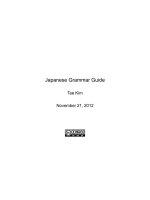8657 present perfect grammar guide
Bạn đang xem bản rút gọn của tài liệu. Xem và tải ngay bản đầy đủ của tài liệu tại đây (99.09 KB, 1 trang )
Present is used to talk about:
- finished actions in a time period that continues up to now. We often use it with
expressions such us today, this year, this week...
- experiences in our lives when we don’t say what happened. We use them with
never, ever...
It is formed: HAVE/HAS + PAST PARTICIPLE.
Present perfect often goes with just, yet and already, which are adverbs that sometimes
give extra informacion that we need to know.
They’re used:
- JUST: When we have finished something, but in the exact moment I say that
I’ve finished. E.g. I have just finished my homework. (He says that he has finished his
homework, and now). Position: HAVE/HAS+ JUST + PAST PARTICIPLE.
- YET: Yet is used in negative statements and questions when we are expecting
something to happen and goes at the end of the sentence. E.g. I haven’t finished yet.
- ALREADY: When we want to mean something that was finished sooner than
expected, we must use Already. E.g. I have already finished my homework.
- STILL: continuing longer than expected. Still is stronger than yet and often
expresses surprise that a situation has continued for so long. She isn’t home yet. She’s
still at work. (! Remember that still can go with other tenses.)
- EVER: is used in questions, mainly. Sometimes, when we want to ask something
that was done in the past and it is told as and experience, we use ever. Have you ever
visited Granada?
- NEVER: it is used in negative sentences. We use it when we want to explane
something that we haven’t done yet, but we could have done it. I have never visited
Granada. (Remember that never is a negative particle so, the auxiliary have must be in
affirmative).
- FOR: We use for+ a period of time. (Remember a period of time not a point in
time). E.g. I’ve lived here for 20 years.
- SINCE: We use since+ a point in time (E.g. a year 2006) Ex: I’ve lived here
since 1990.
CONTRASTING TENSES WITH PRESENT PERFECT.
- Past Simple vs. Present Perfect: Both tenses explane an action started in the past, but
Present Perfect doesn’t say or imply when something happened.
- Present Perfect vs. Present Perfect progressive: Present Perfect progressive is only
used to emphasise an action started in the past and still continuing and the activity and
it’s duration, for example how long.









